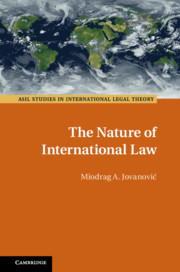Book contents
- The Nature of International Law
- ASIL Studies in International Legal Theory
- The Nature of International Law
- Copyright page
- Dedication
- Contents
- Acknowledgments
- Introduction
- 1 International Law as a Subject Matter of Legal Philosophy – A Brief Historical Overview
- 2 In Search of the Nature of (International) Law – Methodological Postulates
- 3 Typical Features of (International) Law
- 4 International Law as a Normative Order
- 5 International Law as an Institutionalized and (Coercively) Guaranteed Order
- 6 Justice-Aptness of International Law
- 7 Fragmentation – A Special Feature of International Law?
- In Lieu of a Conclusion – A Note on (Un)Certainty
- Bibliography
- Index
7 - Fragmentation – A Special Feature of International Law?
Published online by Cambridge University Press: 15 April 2019
- The Nature of International Law
- ASIL Studies in International Legal Theory
- The Nature of International Law
- Copyright page
- Dedication
- Contents
- Acknowledgments
- Introduction
- 1 International Law as a Subject Matter of Legal Philosophy – A Brief Historical Overview
- 2 In Search of the Nature of (International) Law – Methodological Postulates
- 3 Typical Features of (International) Law
- 4 International Law as a Normative Order
- 5 International Law as an Institutionalized and (Coercively) Guaranteed Order
- 6 Justice-Aptness of International Law
- 7 Fragmentation – A Special Feature of International Law?
- In Lieu of a Conclusion – A Note on (Un)Certainty
- Bibliography
- Index
Summary
- Type
- Chapter
- Information
- The Nature of International Law , pp. 208 - 227Publisher: Cambridge University PressPrint publication year: 2019



